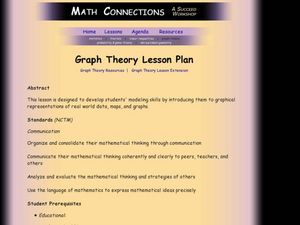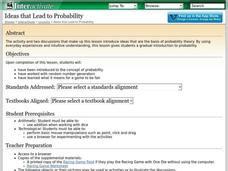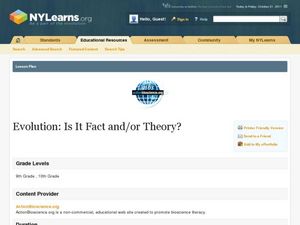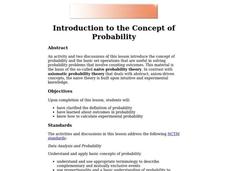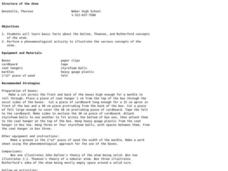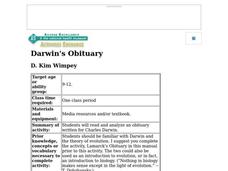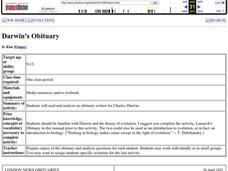Curated OER
Children's Literature Meets Learning Theories
Students examine learning theories and principles through children's literature. In groups, they select theories and create multimedia presentations exemplifying them. Students discuss the various themes related to human growth,...
Curated OER
Graph Theory
Students explore the concept of graph theory. For this graph theory lesson, students participate in hands-on activities that enforce graph theory. Students manipulate graph applets on the internet. Students create a graphical model of...
Curated OER
Color Theory Unit: Tint & Shade Strips
Students create three tint and three shade strips which depict a gradual gradation from color to white and from color to black.
Curated OER
Land Bridge Theory
Fifth graders observe a map that includes where the land bridge was located and that its name was Beringia and look in the Social Studies books to read about the Land Bridge Theory. The class then brainstorms reasons why they think...
Virginia Department of Education
Soap, Slime, and Creative Chromatography
Do you think chromatography paper suffers from separation anxiety? Young chemists make soap, slime, silly putty, and experiment with chromatography in this lesson. The material includes clear instructions for each experiment along with...
Virginia Department of Education
Finding the Formula and Percent Composition
Do you have mole problems? If so, call Avogadro at 602-2140. The lesson starts with pupils working independently to solve for molar mass of ionic compounds. Then they learn to solve for percent composition and later perform an...
Curated OER
Range, Cluster, Gap and Outliers
There are a number of activities here where learners collect and record data, as well as, activities where the likelihood of an event happening is calculated given the experimental probability. Young statisticians organize information...
Curated OER
Theoretical Quantum Physics... For Kids!
Students explore quantum physics by participating in several class activities. In this space-time lesson, students discuss the concepts of time traveling and the anatomy of an atom. Students draw geometric figures and utilize string to...
Curated OER
Acting Like a Hog
High schoolers explore game theory. In this secondary mathematics lesson, students plat the game of HOG using dice and explore the optimal strategies. High schoolers play the game three ways: any number of dice, a fixed...
Curated OER
The Sum of Our Integer Intelligences
Students complete tasks. In this Seven Intelligences instructional activity, students complete a variety of activities that are all based on the seven different intelligences humans are supposed to possess based on Dr. Gardener's theory....
Curated OER
Ideas that Lead to Probability
Students explore the concept of probability. For this probability lesson, students use random number generators to determine probabilities of events. Students discuss if certain probable events are fair. Students determine fair ways to...
Curated OER
Evolution: Is It Fact and/or Theory?
Students explore the concepts of evolution. In this biology lesson, students read articles from the internet. They discuss the article within the group and answer their handouts.
Curated OER
Creative Ways To Teach Evolutionary Concepts
High schoolers explore evolutionary concepts in cartoons and lab activities. They describe and explain evolutionary concepts featured in a cartoon and participate in laboratory activities.
Curated OER
Introduction to the Concept of Probability
Middle and high schoolers have a clarified definition of probability, they explore about outcomes in probability and how to calculate experimental probability. They use computers to learn about probability.
Curated OER
What is the Nature of Science?
Conduct a survey about the nature of science with your high schoolers. They will record their responses in a table and then discuss the implications of scientific theory. Note: There are activity sheets, and forms included with this lesson.
Curated OER
Structure of the Atom
High schoolers observe 3 models that show Dalton, Thomson and Rutherford's theories of the structure of the atom. In this structure of the atom lesson plan, students observe each model and write a summary of each theory of the atom.
Virginia Department of Education
The Cell Cycle and Mitosis
What a packed lesson! Provide your class with the opportunity to learn about the cell cycle in several exciting ways. Biologists first learn about the theory behind mitosis, then proceed to view onion tips under the microscope and create...
Curated OER
The Water Cycle
Fifth graders explore the major components of the water cycle. They pay close attention to evaporation, condensation, and precipitation. A water cycle kit is set up in the classroom, which learners observe for a couple of days before the...
Southern Nevada Regional Professional Development Program
Reading Literature - An Occurrence at Owl Creek Bridge
“An Occurrence at Owl Creek Bridge,” Ambrose Bierce’s short story, is used to model how structural moves, the decisions an author makes about setting, point of view, time order, etc., can be examined to reveal an author’s purpose. Groups...
Curated OER
Darwin's Obituary
Students read and analyze an obituary written for Charles Darwin. They are already familiar with Darwin and the theory of evolution. This is an introduction to evolution, or in fact, an introduction to biology.
Curated OER
Darwin's Obituary
Students read and analyze an obituary written for Charles Darwin. They make a list of facts about Darwin they learned from the obituary. Students compare Lamarack's theory to Darwin's.
ReadWriteThink
Decoding the Dystopian Characteristics of Macintosh’s “1984” Commercial
Known as one of the most iconic advertisements of the 20th century, Macintosh's "1984" commercial has become more of a social statement. Present the ad to a new audience of viewers with a lesson focused on identifying dystopian...
Curated OER
VARVES: Dating Sedimentary Strata: Geology, Paleontological Patterns
Students count the number of varves (annual layers of sediment) in shale billets, taken from the Green River Formation in Wyoming. The count is then extended to reflect the entire 260 meters of sediments where the billets originated.
Curated OER
Investigating Evolutionary Questions: Bats, Whales, Reptiles, Birds, Animal Classification
Students are guided through a process in which three questions are addressed by retrieving beta hemoglobin sequences from online databases, and using online tools to compare those sequences in student-selected animals.



